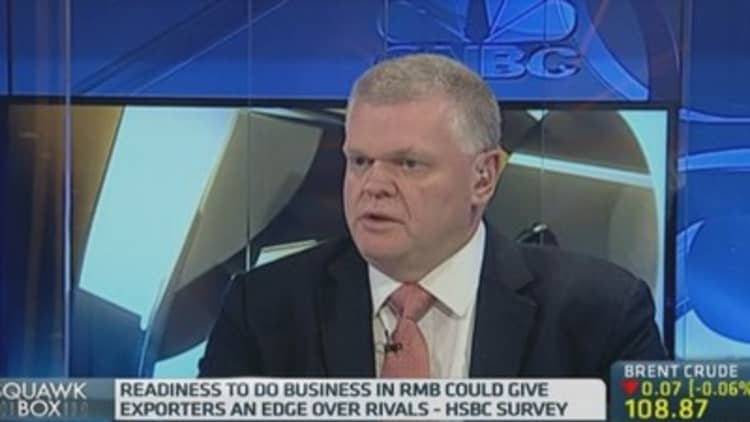
The use of the renminbi in trade settlements increased sharply this year, according to HSBC's annual renminbi survey.
The survey which began last year covered eleven countries, four of which were added this year. All seven markets surveyed in both years posted increases, the largest of which were in Germany, Hong Kong and the U.S.
Read MoreFrom weak to strong: China's yuan changes track
Of the German companies profiled, 23 percent are using the renminbi to settle trades, up from 9 percent last year, while usage in Hong Kong rose to 58 percent from 50 percent and to 17 percent from 9 percent in the U.S.
Usage of the renminbi among French companies - a new addition to this year's list - was high at 26 percent.
Prospects for next year are bright as nearly 60 percent of global companies plan to increase their cross border activity with China over the next 12 months. Currently, 22 percent of companies globally trade in renminbi.
Meanwhile 32 percent of companies who don't use the renminbi expect to do so in the future, HSBC found.
U.K. survey participants were the most enthusiastic about using the renminbi over the next year; 86 percent of U.K. firms plan to use it, followed by Canada at 74 percent, the United Arab Emirates at 73 percent and 63 percent in France.
Read MoreHas China done enough to placate yuan detractors?
Almost half of businesses surveyed see a financial (47 percent) and relationship (49 percent) advantage to using the currency. Among companies already using the renminbi, more than three quarters are convinced of these benefits.
Furthermore, companies told CNBC that the simplification of procedures (68 percent), further exchange rate liberalization (61 percent) and the expansion of transaction types that are renminbi eligible (57 percent) would encourage further renminbi use.

"Most Chinese businesses look favorably on overseas partners who are using renminbi, both because it shows commitment and because it eliminates foreign exchange risk from their cost base," said Simon Cooper, chief executive of HSBC Commercial Banking.
Read MoreYuan's surprise reversal: where to next?
China's total trade in goods surpassed $4 trillion last year, as China overtook the U.S. to become the world's largest trading nation. According to the International Monetary Fund, China will add around $850 billion to global demand this year, the equivalent to adding an economy the size of Indonesia to global trade flows.
HSBC forecasts that a third of China's trade will be settled in renminbi by 2015 and that the currency will be fully convertible by 2017.
Read MoreRussian companies prepare to pay for trade in renminbi
Renminbi trading is partially restricted, as authorities fix a daily midpoint from which it can rise or fall by a certain amount. In mid-March, the central bank doubled that amount - the trading band - to 2 percent, in an effort to move towards opening it up to market forces.
For this year's survey, HSBC polled more than 1,300 decision makers from mainland China, Hong Kong, Singapore, Taiwan, Australia, Germany, France, Canada, the U.K., the U.S. and the United Arab Emirates who represent firms that conduct international business with China.


